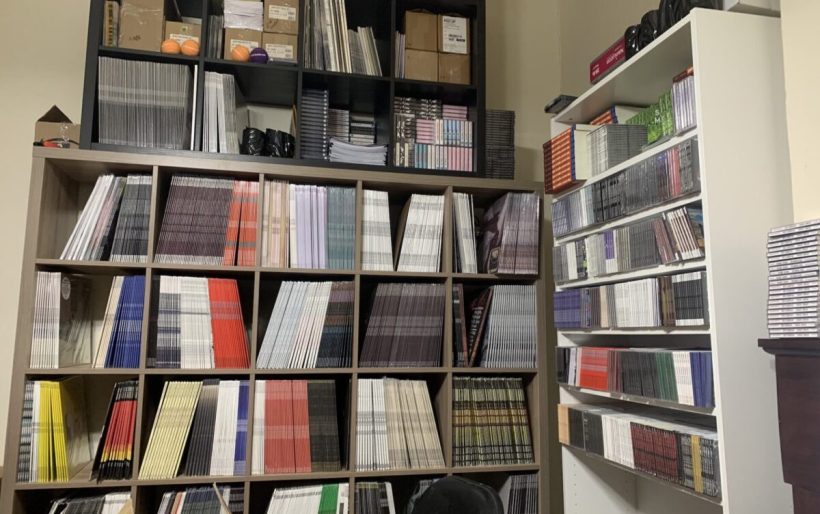Behind The Scene: Who needs a label? Don Giovanni, Lame-O, and Henderson Cole want you to think before you sign.

Don Giovanni Records HQ | photo courtesy of the label
Behind The Scene is a new series which attempts to bring focus to the overlooked aspects of the Philadelphia music community. This is a collection of features on subjects whose stories are seldom told but whose contributions allow the Philadelphia music scene to thrive.
You might be picturing a well-lit conference room on the umpteenth floor of an imposing glass building. You might be picturing a long mahogany table with a dozen chairs flanking its edges. In the chair at one end, you might be picturing a thousand dollar suit, at the other, a punky group of musicians who don’t quite fit the scene. But no matter, they are there for one thing and one thing only: to sign the deal, get the money, and rock the world. Okay, so maybe that’s not quite what you are picturing. Maybe the scene in your head is more handshakes and head nods, napkin-scrawled agreement at a diner the night after a show, informal and relaxed.
The truth, it seems, lies somewhere in the middle. Signing a record deal can be a rite of passage, a way to get your music to as many ears as possible, and a step toward a more sustainable career, but it can also lead to more headaches than breakthroughs. In a world like the strong DIY scene within Philadelphia, where the ideals of profit-hungry capitalism can seem at odds with the scenes’ very ethos, this can be especially thorny. It’s in this collision that we find the independent record deal, an agreement that often falls somewhere between a handshake and a formal contract, and is as important to understand as anything in a musicians career.
Everyone Starts Out Indie
The idea of “indie” music might very well have lost all meaning (just look at the Best New Indie section of Spotify featuring…Lana Del Ray??) but the fact of the matter is every musician begins their career independent, entirely so. Whether you’re hammering out power chords alone in your room, taking jazz piano lessons when you’re four years old, or scrawling rhymes in the margins of your high school notebook, indie is everyone’s starting point.
For some, the goal isn’t really to stretch things much further than that. Back in the early 2000’s, New Brunswick’s Screaming Females were more than happy to continue as a fully independent outfit, putting out their own music, touring, and making a go of things with little oversight or influence. It wasn’t till they were approached by Joe Steinhardt of Don Giovanni Records, a label then in their relative infancy, that they started to reconsider. “He was really persistent about at least getting the opportunity to tell us what he thought we could do that we couldn’t do on our own,” says Screaming Females’ drummer Jarrett Dougherty.

For Steinhardt, the goal was clear: his label was a way to make things exist. It might sound simple, but back before the ubiquity of streaming, music needed to be physical to truly become eternal. Steinhardt would see bands within his scene come and go all time, and it seemed a shame they didn’t have some way to document their years of touring and playing shows. “I am not out there scouting talent as much as documenting what is happening,” Steinhardt says of his label’s process. In this way, he positions Don Giovanni not as some lottery ticket these lucky bands are able to cash in, but as a kind of eternal snapshot of a scene that is constantly shifting. Don Giovanni Records HQ | photo courtesy of the label
Eric Osman, owner and operator of Philly label Lame-O Records, looks at things in a similar light, often actively searching out music within his tight-knit Philly scene, though he admits personal taste is a pretty important factor. “We really need to be passionate and see some promise in what the artist is doing,” says Osman. Things at Lame-O, as with Don Giovanni, are weighted heavily toward the artist, with Osman focus almost exclusively on what the label can do for a musician looking to grow into something they can’t quite manage themselves. As both Osman and Reinhart will admit, musicians don’t inherently need labels, but they do believe they have plenty to offer in the right situation.
For some musicians, the label can represent something much different. “As a kid, I saw being on a record label as The Great Legitimizer,” says Maxwell Stern, Philly-based songwriter, who admits this viewpoint shifted a bit as the internet made things a little less stratified. When he did eventually make the move to a label, it was almost by accident. As with Screaming Females, Stern’s band Signals Midwest were more than comfortable continuing their career self-releasing. It was only after looking for a more robust public relations campaign that they eventually got hooked up with Carolina label Tiny Engines (more on them later). For a small punk band out of Ohio who wanted to expand their reach as much as possible, this seemed like an awesome opportunity and the label’s history working with bands like Restorations and Tigers Jaw only made things more appealing.
There are countless stories like this, bands firmly established within local scenes looking to that next step, even if they might not be exactly sure what that means. The same goes for labels who are often just as independent and informal as the artist they manage. In this way, independent record deals mark a change, a shift when a hobby becomes something more, when dreams are validated and forever documented, but, as we’ll soon find out, things can also get a lot more complicated.
Stepping Out of the Basement and Into A Binding Agreement
I will admit I am a full indiehead. I have always identified indie music, again an increasingly fickle signifier, as my favorite kind of music. That being said, I never really considered what makes an indie artist independent and, more importantly, what goes into the contracts they sign to remain independent while still gaining notoriety and attempting to establish a career of sorts within the music industry. That obliviousness changed back in 2018 when the aforementioned indie label Tiny Engines started making headlines for all the wrong reasons.
It all started with a Twitter thread from Adult Mom’s Stevie Knipe in which they accused Tiny Engines’ CEOs Chuck Daley and Will Miller of, among other things, breach of contract, withheld royalties, and some downright unprofessional and manipulative behavior. As it turns out, this was not the only negative experience artists had with the label, with several other musicians, including Philly’s Mannequin Pussy, coming out in support of Knipe’s statements. Sketchy behavior by labels isn’t necessarily a surprise, but in the world of independent artists coming from a DIY scene, this was a bit of a wake-up call.
Entertainment Lawyer Henderson Cole, who has worked with musicians like Harmony Woods, Oso Oso, and Slingshot Dakota, is quite familiar providing his own brand of wake-up calls to independent musicians. “Ninety percent of my job is explaining music law terms to people who aren’t really familiar,” says Cole, who himself emerged from a DIY scene, having founded the music blog The Alternative.
One of the most important things to remember, he says, is that any contract you sign will likely last for a very long time and all the eventualities of the agreement need to be considered. “Everyone is always thinking positively, and that’s good. A lot of artists are really excited to be signing a deal and they should be. But sometimes it doesn’t work out down the line,” says Cole. “The key things to remember are how are you getting paid, who has control of what, who are the ones making the decisions.”
Essentially, most independent contracts break down to three important factors; royalty splits, term lengths and master ownership. For most small, independent labels, royalty splits are part of a general blueprint they have for most contracts. For instance, Don Giovanni offers each of their bands a 60/40 net-profit split, meaning after costs are fully recouped, the label takes forty percent of the profits from things like streaming, physical sales, and any merchandise the labels sells themselves, leaving the remainder for their musicians. However, it is important to identify what exactly qualifies as recoupable costs. For most contracts, this will include anything spent on the creation of the album as well as marketing, but agreeing on just how much money the label spends, and on what, is something artist’s must consider, as runaway label expenses can significantly cut into any profits an artist or band may see.

Term lengths can be another thorny issue, as most bands aren’t thinking of worst case scenarios. “When you are signing a deal, you already have to be thinking ahead and considering, for example, if album one goes badly, what can we do,” says Cole. You might sign a contract that states the second album is optional, but more often than not, the option lies with the label and not the artist, meaning a musician won’t be able to get out of an agreement as easily as they may think. To Joe Steinhardt, these kinds of three-album deals are inherently predatory, as the goal seems to be to lock artists into unfavorable contracts and if we learned anything from the Tiny Engines situation, things can go wrong fast.
If you’re familiar with any of these issues, it may be master ownership, as it has become a hot topic with even the biggest names in music. In the past, labels almost always owned an artist’s masters in perpetuity, able to profit off the music forever. As of late, many musicians are reconsidering this arrangement, and it makes sense, as the industry has changed immensely over the last decade plus. “It is one of the things that everybody is fighting about these days,” says Cole. “Even in just the time I have been in the music industry, labels that always did master deals got kind of shamed into doing long-term licensing deals.” The reason is simple but essential: licensing deals expire. Whether the deal be for seven, 10, 15, or 25 years, expiration opens up the opportunity for artists to make more money, or at least make their own decisions concerning their music further down the line.
As Audrey Morgan, artist manager for Phily’s Lost + Found Management, explains, master ownership can sometimes be the most important thing to an artist. While working with her most recent client, Brooklyn songwriter Rae Goldwoman, Morgan created a master list of potential labels, reaching out to dozens of possible matches, trying to settle on something that would work for all parties involved. Eventually, she found a home with North Carolina label Self Aware, but only after the label agreed to make an important exception. “Self Aware Records doesn’t typically do contracts, but we wanted to have a thorough contract because Rae wanted to keep her masters,” says Morgan. As Cole tells it, this amount of forethought may be a bit of an outlier, as many artists fall into a trap of thinking purely in the short term, not taking into consideration just how long their music will exist and how important it will be to take back ownership at a later date.
It can be a bit dizzying to consider all of the things an artist must know before making even what may appear as a relatively laid-back agreement. These are not seasoned vets of the music industry we’re talking about either. More often than not, these are young people looking to take a modest step in their career, making the possible pitfalls all the more scary. Signing to a label might be the next step out of the basement, but it is far from the be-all and end-all, and putting a signature on the wrong deal may be far worse than no deal at all.
Hi, What Can I Do For You?
Think about it, you’re a young band fresh off a buzzy EP and tour opening for an artist you love, your name is out there and there is palpable excitement, you get word a few labels might be interested in putting out your debut LP. This is sick, you can’t believe it: just last year it was sweaty basement shows for free and now you’re going to sign a record deal. Okay, cool, but why do you want to sign a deal? “A lot of times artists can’t articulate a good answer to that question,” says Steinhardt.
Even if an artist and label relationship isn’t inherently toxic, things don’t always go as smoothly as one might hope and it isn’t always the label to blame. With so many moving parts and so little available information for young musicians, there can often be a chasm between expectations and reality, creating fundamental misunderstanding.
It all begins with knowing what it is you want from a label, not simply jumping at an opportunity for opportunity’s sake. It’s the first thing Steinhardt tries to get at when he talks to a prospective artist, trying to push them to consider the necessity of the agreement they’re about to make, asking them not only why they want to sign a record deal but why they want to work with Don Giovanni specifically. Steinhardt often finds the first things on an artist’s mind are press and promotion which, while something a label can surely facilitate, is not really their area of expertise. Sometimes a band’s wishes are even more nebulous and vague, as Stern will attest. “A big mistake that I made in my younger days was thinking that having a label would give me the cred that I needed to ‘level up’ in the music world,” he says. There are bands that need what a label can offer but there are plenty who don’t and knowing in which camp you belong is essential.
Even when artists do have reasons for wanting to sign with a label, their wishes can be a little misplaced, and their expectations wildly inflated. Part of the problem in this regard lies with the labels themselves, who have an incentive to promise the moon, even if they know it is unattainable. “Artists are constantly being lied to about the expectations of what a deal really means,” says Steinhardt. To combat this, he tries to keep the lines of communication open and properly establish what exactly it is he can accomplish. Yes, a label can aid greatly in distribution and offer the kind of capital a small band could never muster themselves, but they will have very little to do with your band landing a large-font slot on that big festival poster. As a rule, Steinhardt has learned to avoid predicting anything, especially in an industry as fickle and amorphous as independent music.
Everyone I talked to tends to agree that transparency and honesty are the best way to avoid conflict. From the small DIY labels like Lame-O to largely independent artists like Stern, knowing what a record deal fundamentally means is the most effective way to get the most out of the relationship as possible. “Our relationship with our label is solid because we’re honest with each other about what we can accomplish and what our likes / dislikes are,” says Stern. “When expectations don’t align, it can stop being fun pretty quickly.”

When we talk about independence, we often focus solely on its merits. The freedom to practice your art unencumbered by evil corporate overlords is obviously an admirable pursuit, but what we forget about independence is how isolated it can leave an artist. From the moment they start out, they are responsible for every decision and there is very little in the way of safety-nets should they choose poorly. No musician wants to get themselves stuck working in a situation where their art is not treated with the utmost importance and where the dollar reigns supreme, but even the best intentions won’t necessarily lead to the most favorable outcomes. The fact is, there isn’t a one-size-fits-all syllabus for becoming a successful indie musician, but knowledge and communication will give a fighting shot.